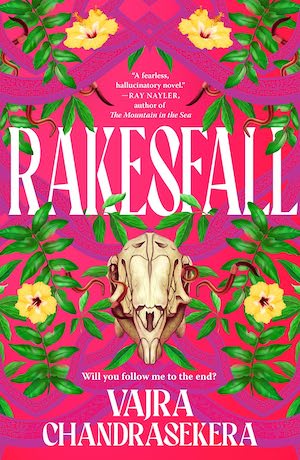The other week I wrote a column that was, in large part, about how I could not figure out how to review Vajra Chandrasekera’s second novel, Rakesfall. I thought if I put in the column all the things around the book that I could not stop thinking about—the pressure to be authoritative in one’s critical opinions; the majestic delight of reading such a beautiful book and knowing there’s so much I have yet to uncover about it; the way that insisting that we “understand” the art we experience often cheapens both us and the art—I thought if I cleared my throat of all of that, I might find what I wanted to say.
But sometimes there is just too much.
Rakesfall is a story about continuity, oppression, freedom, curses, justice, and the longest, deepest view of time. It is about ancestors and kin, lovers and enemies, colonization and the eventual diaspora that will include all of humanity if this planet becomes unlivable. It is about all of these things and more because, as Chandrasekera writes, “There is a dread scale at which only myth works; only nightmare has the technology.”
A dread scale: That is a useful phrase to keep in mind. That scale isn’t quite visible where the book begins, with Annelid and Leveret, two youths who live in a jungle (that is also a former rubber plantation) and are watched by a gaggle of ghost children. The watching children are in turn watched by Annelid and Leveret on the television that constitutes their schooling. This story, like each story that makes up this novel, tells you how to read it: The protagonists, if you consider the ghost children to have that role, don’t exist only at one time. They watch as other children learn their history. Their lives are small and mighty, past and present. Someone is always watching, and someone is always learning.
The ghost children consider themselves the fandom of Annelid and Leveret’s story, which they call the Show, though it is not made like a normal TV show. (“There have never been any cameras, except when we make a box with our fingers like this to frame a scene.”) Annelid and Leveret, in their lives, are “being trained to become audience,” as they watch what the fandom refers to as the Documentary—which is about the fandom.
If you look at this circle, this cycle—the watched, the watchers who are also the watched, the past learning from the future and vice versa—you begin to see the shape of things. And Chandrasekera semi-regularly drops phrases that are as good as directions. “Memory is a kind of possession” is one of them. “We revisit meaning with an ending in hand” is another.
“In every world, I’ll look for the revolution” is a third.
One concept you will learn while reading Rakesfall, if you don’t already know it: the akashic record. This impossible thing contains a record of everything that has ever happened or ever will happen. Rakesfall, in a sense, is a scrap of the akashic record. It can’t tell you everything about the characters it follows, but it will tell you a lot.
Buy the Book


Rakesfall
Annelid and Leveret are gone (mostly) after the first story, and Chandrasekera is off through time, through the world, and through a series of stories that address—forgive me while I borrow a phrase from his blog—”the connectedness of all struggle against oppression.”
One way to read this book is about a pair (mostly) of reincarnating beings as they tumble through time from sometime in the mid-17th century to a barely imaginable future in which the planet is a dustball caught in a new cycle of regreening and the whims of now-distant humanity as it spreads across the stars. Names recur, and histories loop, and these beings remain connected, fighting for freedom of all kinds, whether from curses or kings. There are sometimes, maybe, more than two beings; I laughed out loud at the description of “a group chat log that takes up more message space than any other human artefact in the history of the planet.”
Another way to read the book, I think, is that there are not necessarily two characters, and there are not necessarily any number of reincarnating souls. There are an endless series of characters caught in the red web (which is neither red nor a web), continuing the battles fought or lost by those who went before. “Self is porous,” one character says. The word “kin” comes up more than once. “You can only resolve your own paradoxes and become more of who you are,” says Grandmother Sits, who explains a lot of useful things.
Or maybe there is one character, in all their different forms and guises, becoming more of who they are, again and again and again. “Gender is only genre,” Chandrasekera writes at one point. To be honest, at some point I stopped worrying about it. I had been lightly tracking names, curses, characteristics, who is killed and who does the killing, who holds a grudge and who maybe stays dead for a while. And then I let it all go. That keeping-track impulse felt like trying to solve the book like a problem. But the book isn’t a problem, and it doesn’t need solving. It needs you to sink in, and to listen.
Part of Rakesfall takes place in Luriat, the city from Chandrasekera’s debut, The Saint of Bright Doors. If you read Bright Doors, you may remember that doors in Luriat are not to be closed. You may find a connection between that and a curse one character bears—a curse they shed between worlds, or lives. Luriat, here, is also the city where the dead don’t leave, but hang around, often unwanted. There is a whole economy involving a substance that makes the smoke that scares the dead away.
Rakesfall is, in my limited understanding, a very Sri Lankan book. If you spend five minutes with an encyclopedia entry on Sri Lanka you can put that much together. But making the connection isn’t the same as understanding it. There is myth being retold here, in the story of Rakesfall, an event which is described in bits and bobs. Part of it is a story about grief; part of it involves the invention of marriage; and part of it involves a power called the Yoke, whose people are priests rather than artists.
I know this is not about my history, my part of the world, and yet it’s hard not to see parallels with the dominating, colonizing north versus the many countries it has stormed into—places that don’t see the world the same way. Places who don’t make art the same way, also.
However you read this book, the stories within it are rich, moving, powerful, and sometimes—this is worth mentioning again—very funny, and often funny in the language of a person of a certain age who has spent time on earlier incarnations of the internet. (When Chandrasekera gets tart and internetty—such as in the story involving one Beloved Bro—it reminds me, very wonderfully, of Catherynne Valente at her most tart and internetty.)
In one of the book’s sections, a story is told about a greedy son who wishes to steal his father’s kingdom but finds his plot undone by the tiniest of creatures. You might expect it to be a story about the downfall of kings, and sure, most kings in this book do or will fall, somewhere off the page and in the distance. But more immediately, it’s a story about power, and how something so small and fragile might be the point upon which a world turns—even if that world is just one life. (“Wasps are free of thrones and symbolism alike,” says grandmotherboard earth, who tells this story far in the future. I love grandmotherboard earth.)
In another story, a being explains the rules of a game, only to have their power—the power of knowing the rules—taken from them by a bunch of clever children who understand something very important, even at the end of the world: “Punish the guilty, and eat the rich.”
There’s a phrase Chandrasekera uses near the end of Rakesfall that made my breath catch in my throat. Describing a whole host of people and characters, a “long line of grandmothers” mingling with “grandfathers and grandothers,” he calls them all, “kin by intention and commitment to the art, not blood or soul or lineage.” There’s a refusal inherent in this beautiful summary: It’s not souls or families or anything traditional or happenstance that connects all the stories that flow through this book. It’s “intentions and commitment.” These are the people the stories here are about: people who have chosen to live a certain way, to always seek the revolution. They fail a lot. But they are seeking. And if you go seeking in these pages, there’s so much to find.
Rakesfall is published by Tordotcom Publishing.

